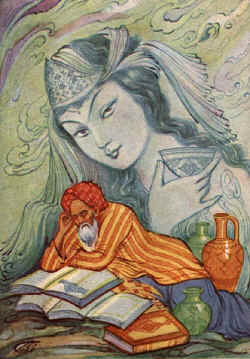Philosophy
It is quite appropriately claimed that Khayyam was the poet of destiny.
However, it will be very wrong of us to think that he was a fatalist, at least by the
common understanding and definitions that we have of this word.
There are two major schools of thought in trying to classify Omar Khayyam's Rubaiyat. One claims that he was highly influenced by Islamic mysticism, and particularly sufism, and his references to wine and lovers are allegorical representations of the mystical wine and divine love.
A second school of thought refutes the first completely, claiming that Khayyam understood his mortality and inability to look beyond, and his references to wine and lovers are very literal and sensual.
Khayyam himself has given us a clue in one of his Rubaiyee's (singular for Rubaiyat), when he literally says:
It is safe to assume that both the above schools of thought are somewhat erroneous, and that the proponents of each, while half understanding the wisdom that Khayyam imparted, are turning and twisting his words to suit their own beliefs.
One only has to look at Khayyam's life to come to the same conclusion. He was a super-achieving genius. He was counsel to ministers and kings. He was a mathematical genius, presenting solutions to problems that were centuries ahead of his time. He was a highly knowledgeable astronomer, who calculated the duration of the solar year with unmatched accuracy, at least unmatched until this century. He was knowledgeable in other physical sciences such as medicine and chemistry (or alchemy at his time). He was a much sought after philosopher and teacher.
The very fact that he had the urge, the drive, and the discipline to compose and write the Rubaiyat, shows that he had a depth of perception and vision that we are still having difficulty understanding.
A man who has done so much in his life is clearly not a mystical fatalist claiming "what will be, will be!" To the contrary, he saw the folly of being mesmerized by such techniques, which may bring amazing visions of reality, but so long as they remain visions, they are not and cannot be the truth, the reality itself.
Furthermore, a man who changed the world of his time and for centuries after, is clearly not one who would say, "since we are all going to die, let us concern ourselves with sensual pleasures only." He clearly saw that just as mystical infatuations were merely visions of reality and not the truth, sensual pleasures were also representations of a deeper joy and not the truth either.
Anyone who can so clearly pose the questions of mortality and temporality of our existence has obviously struggled deeply with life and death and existence. Khayyam understood the meaning of not being in control of our lives and deaths, and found the limits of our freedom. He understood what was important in life. And through his life, his teachings and his Rubaiyat conveyed that meaning, though in somewhat of a cryptic form, nevertheless complete and intact to us.
Khayyam understood that it was our fate, our destiny, something beyond our control to be born into this world. He also understood that death was an inevitable fate for anyone who was ever born. He understood that our bodies come from dust and clay, and return to clay. He understood the fantasy of concerning ourselves with the future, as well as the neurosis of staying in our past. He saw that all we have is this ever slipping moment, this now, which itself has a timeless quality.
And he understood that in life what is important is that deeper joy and love for which we have infinite yearning, as well as capacity to both receive and emanate. His Rubaiyat force us to ask those ultimate existential questions, and lead us down a path that, unless we are lost along the way or are destabilized by the abyss which we must traverse, must inevitably reach the same answer. Those ultimate truths that in life all that matters is love and joy. All else is fantasy and fallacy.
If we accept Khayyam's philosophy and heed his advice, then we will shift our focus from the external, be it mystical or sensual, to the internal. And if we go through this transformative alchemical transmutation of the soul, we too will become like Khayyam, men and women who change ourselves, and consequently our world, as well as the future worlds to come.
![]()
©
1998,
Vancouver Canada, 1999 - 2003, Los Angeles, CA
You may use any part presented herein for non-commercial purposes only, on the condition
of giving full credit to the author and to this home page, including a hyperlink, if you
wish to use these material over the Internet.
This page was last updated on Thursday, April 22, 2010